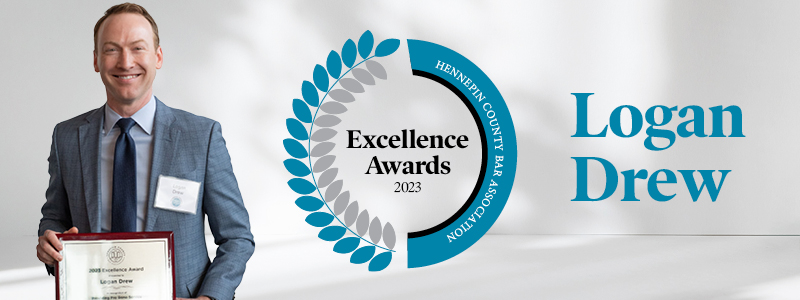
Logan Drew was awarded the Excellence Award for Providing Pro Bono Service. As chair of Robins Kaplan’s pro bono committee, Drew helped launch the Robins Kaplan Name Change Clinic in 2019. Under Drew’s leadership, the firm has hosted 15 clinics, helping 225 clients seeking a gender-affirming name change through 800 hours of pro bono legal aid.
1. What has been a meaningful moment in your pro bono service?
My pro bono career has included many meaningful moments, which I think is partially a product of the stakes of direct-representation pro bono cases. Even small, procedural victories can have a huge impact on real peoples’ lives. From the Robins Kaplan Name Change Clinic, for example, it has been incredibly meaningful to help members of the transgender and non-binary communities through the name-change and gender-marker-change processes, and to obtain these deeply meaningful affirmations.
Perhaps the most meaningful single moment in my pro bono service came after several years of representing a farm worker and victim of labor trafficking in his pursuit of permanent status in the United States. I worked with him first to obtain a T-visa, then to bring his wife and three small children to the United States to be with him after they were separated for more than two years, and finally to obtain permanent residency for the entire family here in the United States. When we finally received green cards for the family members, the whole family made a special trip to Minneapolis to enjoy the city and celebrate the security that their permanent status provided. The joy (and tears) we shared during that last meeting is unmatched in my career to this point.
2. What do you wish more attorneys knew about your area of pro bono?
My belief is that one of attorneys’ biggest mental barriers to doing pro bono work is that we like to be good at what we do, and it’s scary to take on work in an area that is unfamiliar to us. We don’t want to fail. What I wish more attorneys knew about the work our firm does in Robins Kaplan’s Name Change Clinic is how easy it is to learn the name-change/gender-marker-change processes and how big of a difference we can make with a small-time commitment. The processes in Minnesota are form-driven and can be difficult for non-lawyers, but for attorneys of all kinds, it is relatively simple, and it represents a great chance to make a huge difference for members of a vulnerable community.
3. Who is a legal hero/mentor to you?
My first legal mentor, whom I started working with my first week at Robins Kaplan—and my first week as an attorney—was Bill Manning. Before he retired, I worked with Bill on a variety of patent litigation cases, which is the focus of my billable practice. But separate from that work, one of the things Bill modeled for me from the outset as a senior partner at the firm was the importance of pro bono work, and in particular, how critical it is to treat pro bono work like billable work. Some types of pro bono matters don’t have the same hard deadlines as other legal work, and one can often justify putting pro bono cases further down the priority list than cases with more pressing deadlines. Bill impressed upon me the importance of pouring everything into pro cases and driving them forward with the same intensity I would for any other type of case. Although I did not work with Bill on any specific pro bono case, the things he taught me have been incredibly beneficial across my entire practice, pro bono and billable.
I would like to see the legal profession as a whole, and our local legal community specifically, put a renewed emphasis on pro bono work.
4. How would you like to see the legal profession or our local legal community change?
I would like to see the legal profession as a whole, and our local legal community specifically, put a renewed emphasis on pro bono work. The pandemic has been incredibly difficult on everyone, for all kinds of reasons, and one of the dynamics we have observed in the pro bono community is that overall pro hours in total, and on an attorney-by-attorney basis, are down significantly and have not recovered to pre-COVID-19 levels. Many attorneys understandably felt the need to ensure the survival of their practices through difficult financial conditions and to look out for their own well-being, so pro bono work became a lower priority. At the same time, the need for pro bono assistance has skyrocketed. My hope is that we, as individual lawyers, and law firms, all take the time to reevaluate where our priorities lie and remember the important role we serve in our communities.
5. What do you do to unwind and recharge from your work?
My kids are my outlet. Although they probably do the opposite of recharging me, they certainly help me unwind, and they put everything else I do in perspective. They are seven and five, and they are in a ridiculous number of activities year-round, so it feels like I spend about as much time on the sidelines of sports fields as I do in the office. It’s a source of great joy and a great way to totally disconnect from work in one- or two-hour chunks. Separately, there is no DIY home project I won’t tackle, often to my family’s chagrin.